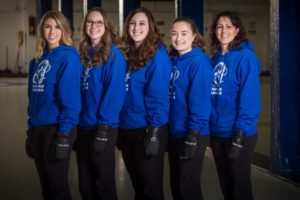The Camosun Chargers have added a women’s curling team to their roster. The team formed after a group of Camosun student athletes talked to Melissa Soligo, who expressed interest in coaching the team. Soligo, an Olympic athlete, then approached Camosun recreation and athletics coordinator Graham Matthews to get the process of starting a curling team at the college underway.
“I said that we don’t have a program right now because there’s no PACWEST [Pacific Western Athletic Association] league,” says Matthews.
But Soligo had her visions set on bigger things for the Chargers. She told Matthews there was a group of students at the college who had done well in curling; Matthews says that, as long as they were all student athletes at the college who met the minimum grade requirements to play their sport, the college approved of getting a team started.

“We pursued it,” says Matthews. “We’ll send [them] off and see what happens at the national championship.”
What happened was that the Chargers curling team—made up of skip Taylor Reese-Hansen, third Jordan Koster, second Mariah Coulombe, and lead Sydney Brilz—took home silver at the Canadian Collegiate Athletic Association National Curling Championship—held in Leduc, Alberta from March 24 to 28—but not without some unexpected obstacles along the way, as Koster broke her foot two weeks before the event.
“We actually played the entire national championship shorthanded. We played with three players the entire week,” says Soligo.
Soligo made some quick coaching adjustments to accommodate and says the team played with resilience.
“We had to change our systems a little bit,” she says. “Normally, everyone sort of has one or a couple of jobs, so what we did is we employed our person who was either throwing or holding the broom in the house to come out and help sweep so that we had two sweepers when we could. We had to change the way we threw the rock.”
Reese-Hansen—who was named a tournament all-star at the event—says the team wasn’t going to let injuries affect the outcome.
“We didn’t really know what to expect going into it,” she says. “Just because we’ve never had to play with just three players. It was an experience. But we weren’t going to let that affect our results.”
Soligo says the team more than exceeded their goal of going to the nationals; she adds that it’s now her job to keep the athletes calm and focused.
“Being in those high-calibre events, you sort of have to guide the athletes and keep them focused on the plan,” she says. “As an athlete, you get pretty hyper and the adrenaline starts flowing when you’re out there.”
